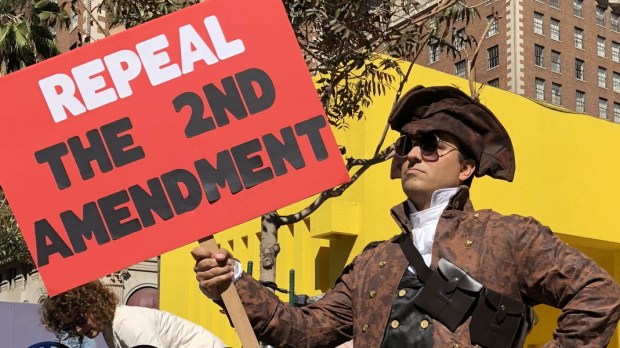President Donald J. Trump will hold a “listening session” on the issue of gun control this week in the wake of the Florida high school mass shooting that claimed 17 lives.
With yet another mass shooting, there have been new calls for tougher gun control laws, while political leaders and constituents who fear a chipping away of the Second Amendment right to bear arms approach the issue warily.
But there is a “significant amount” of gun control legislation already, going back to the 1934 Federal Firearms Act, said the Cato Institute’s Trevor Burrus. In addition, there are many state-level regulations.
“For me, the starting point is that there are 350 million guns in this country, and that’s not going to change anytime soon,” Burrus said in an interview. “The question is, given a certain proposal for a gun control law, will it do what it’s supposed to do? Will it affect crime rates, violence rates? Or will it put a bunch of people through needless hassles and make them go through needless barriers just to go hunting, for example?”
Burrus says it’s important to remember that guns have both “violence-augmenting and violence-decreasing capabilities.”
“They can be used to commit violence and to protect people from violence,” he said. Because protecting oneself is a “fundamental right,” he added, the Second Amendment to the U.S. Constitution will always be relevant and is not outdated.
But Saul Cornell, professor of American history at Fordham University, argues that the United States is hampered by a “fairly minimal and ineffective regulatory regime, and there are a lot of things that we could be doing that we’re not doing that would make everyone safer and not come at an unreasonable cost to gun owners.” For example, laws restricting research could be liberalized to help get a better picture of the problem.
“Right now, thanks to the efforts of the [National Rifle Association] and other gun rights organizations, it’s virtually impossible for the Centers for Disease Control and the National Institute of Health to do meaningful research,” Cornell contended.
Cornell said that the NRA-backed Dickey Amendment makes it impossible for key government research organizations to do meaningful research on firearms.
“Gun trace data is not available to researchers unless it’s in aggregate form, which means, of course, you couldn’t actually point the finger at anyone for selling lots of guns to criminals,” he said in an interview. The Bureau of Alcohol, Tobacco and Firearms is “not allowed to use the most sophisticated, up-to-date computer technology to make firearms tracing for crime guns fast.”
Cornell added that lawmakers should consider expanding the number of categories of people who are ineligible for firearm ownership.
”Clearly, someone who is dangerous enough to be suspended from school ought not to be eligible to purchase firearms,” he said. “Probably raising the age at which you can buy a firearm is a prudent idea. Universal background checks would be a good thing as well. Keeping track of who’s buying ammo, so that spikes in ammunition sales could lead to some innocent questions like ‘Why are you buying tons of ammo when you’ve shown no interest in competitive shooting?’” would help, he said.
As for the Second Amendment, whether one believes it is written in stone or is subject to change, all rights are subject to varying degrees of regulation, Cornell said.
“Even if you thought the Second Amendment should be analogized to core principles of the First Amendment, which is kind of silly because you wouldn’t necessarily think that guns and words are two things that ought to be treated the same—no one’s ever been a victim of a drive-by printing,” he said. “Even if that were true, it would still be subject to a whole range of regulations: You need a permit to have your parade. You need a permit to protest in certain areas where there are legit public health or public safety concerns.”
The same, he said, applies to the right to bear arms.

